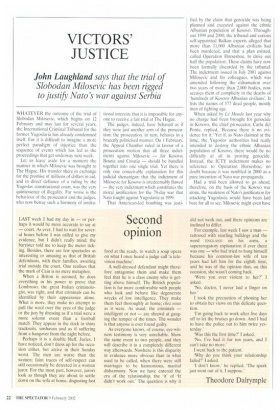Second opinion
LAST week I had my day in — or perhaps it would be more accurate to say at — court. As ever, I had to wait for several hours before I was called to give my evidence, but I didn't really mind; the barrister told me to keep the meter ticking. Besides, there are few spectacles as interesting or amusing as that of British defendants, with their families, awaiting trial outside the court. One realises that the mark of Cain is no mere metaphor.
When a Briton is accused, he does everything in his power to prove that Lombroso, the great Italian criminologist, was right, and that criminals can be identified by their appearance alone. What is more, they make no attempt to pull the wool over the eyes of the judge or the jury by dressing as if a trial were a more solemn event than a football match. They appear in the dock in shiny tracksuits, unshaven and as if suffering from a hangover from the night before.
Perhaps it is a double bluff. Juries, I have noticed, don't dress up for the occasion either, but arrive in their Sunday worst. The men are worse than the women; faint traces of self-respect can still occasionally be detected in a woman juror. For the most part, however, jurors look as though they are about to settle down on the sofa at home, disgusting fast food at the ready, to watch a soap opera on what I once heard a judge call 'a television machine'.
A well-dressed defendant might therefore antagonise them and make them feel that he is a class enemy who is getting above himself. The British population is far more comfortable with people who look and behave like degenerate wrecks of low intelligence. They make them feel thoroughly at home; chez nous as it were. As usual, the criminals — intelligent or not — are shrewd at gauging the temper of the times. The wonder is that anyone is ever found guilty.
As everyone knows, of course, eye-witness testimony is very unreliable. Show the same event to two people, and they will describe it in a completely different way afterwards. Nowhere is this disparity in evidence more obvious than in what used to be called, when there were still marriages to be harmonious, marital disharmony. Now we have entered the era of the relationship, the 'it' of 'It didn't work out.' The question is why it
did not work out, and there opinions are inclined to differ.
For example, last week I saw a man — tattooed with snarling bulldogs and the word ENGLAND on his arms, a supererogatory explanation if ever there was one — who had tried to hang himself because his common-law wife of ten years had left him for the eighth time, and he was of the opinion that, on this occasion, she wasn't coming back.
'Were you ever violent to her?' I asked.
'No, doctor, I never laid a finger on her.'
I took the precaution of phoning her to obtain her views on this delicate question.
'I'm going back to work after five days off to let the bruises go down. And I had to have the police out to him twice yesterday.'
'Was this the first time?' I asked.
'No, I've had it for ten years, and I can't take no more.'
I went back to the patient.
'Why do you think your relationship failed?' I asked.
'I don't know,' he replied. 'The spark just went out of it, I suppose.'
Theodore Dalrymple






































































 Previous page
Previous page